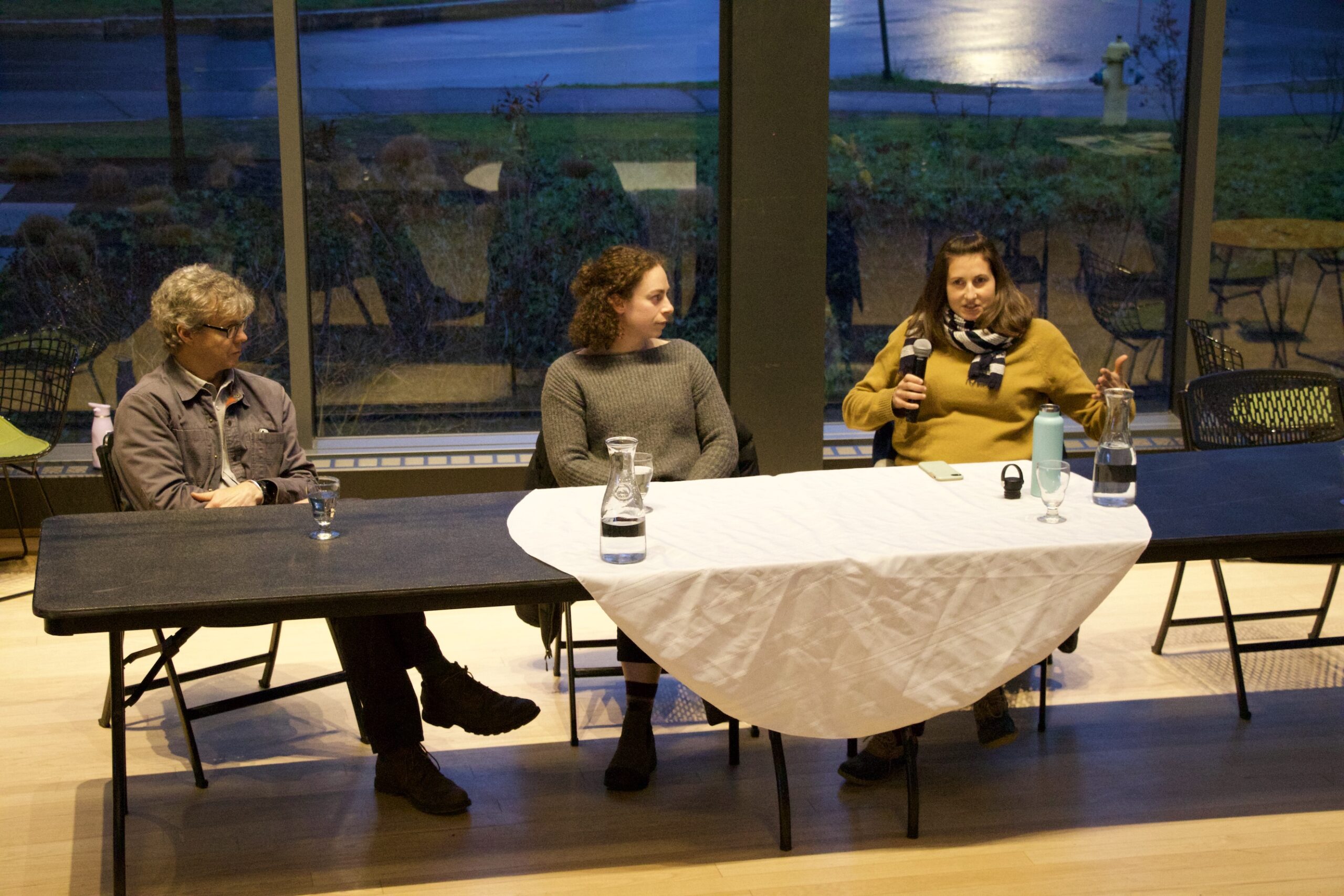Sustainable agriculture panel illuminates networks of change
May 5, 2023
 Andrew Yuan
Andrew YuanOn Wednesday, The Civic Engagement Team of the Office of Sustainability hosted the final talk of their month-long series on sustainability practices in agriculture.
Entitled “Farming For a Greener World,” the talk covered the relationship between agricultural practices and climate change, the intersection between capitalism and sustainability and sustainable methods to grow food. Three speakers joined the panel of agricultural experts: co-founder of non-profit Growing to Give Carrie Asselin, Professor of Natural Sciences Barry Logan and Bowdoin Organic Garden (BOG) Supervisor Lisa Beneman.
In coordination with the Civic Engagement Team, Student Sustainability Coordinator Luke Bartol ’23, chose this panel topic in an effort to invite students to engage with an aspect of sustainability not often discussed within the Bowdoin community.
“We’ve tried to cover different topics that students can engage with outside of the Bowdoin bubble,” Bartol said. “We want to engage community members and make it so that you can think about how to [be sustainable] beyond Bowdoin. Now that the weather is nice, we figured we can talk about sustainable agriculture.”
As a member of the panel, Asselin spoke about her past experiences with farming and how they have shaped her current perspective on sustainability practices.
“My background with teaching science [and] as a Quaker dictates the way I view the world. I often find myself really looking at nature as the ultimate guide for what sustainability can look like because nature tends to not screw up and run out of resources,” Asselin said. “There’s always a way in which the ecosystem keeps on going.”
With regards to sustainability in farming, Asselin noted how agricultural practices can disrupt soil structures, which results in erosion and water loss.
“Farming, no matter how you do it, is going to fundamentally affect the biological, chemical and physical characteristics of soil. This is now going to have a cascade of downhill effects on the ecosystem, atmosphere and climate,” Asselin said. “Tillage, for example, has a really big physical disruption of soil [resulting] in a loss of soil organic matter.”
Even with new innovations in agricultural practices, Asselin noted how scientific research is often motivated by profits.
“A lot of the innovations in farming are being driven by profit yields. But what’s the effect on soil, on human health, on the environment?” Asselin questioned.
Likewise, Beneman believes agriculture plays a big role in climate change and sustainability, but she hopes that the public does not immediately villainize large agriculture corporations or monocropping—the practice of continuously cultivating the same crop on the same piece of land, which often depletes the soil.
“I’m not saying that those things are good or not contributing to climate change, but that it’s a really big complicated conversation that requires a broader understanding of what good and bad are,” Beneman said. “The conversation that simplifies [sustainability] to this level is almost dismissive of the conversation as a whole.”
Logan noted that newer innovations in agricultural practices are often energy-intensive, which results in an increase in fossil fuel emissions.
“We burn an enormous amount of fossil fuel just by creating the conditions to make fertilizer, which then goes in the farm which requires transportation. There are hidden costs in generating some of the fertilizer in a conventional agricultural scheme,” Logan said.
Logan further noted a second concern about sustainable agriculture: waste problems when it comes to confining a large amount of livestock on farms, which are often used to produce fertilizer.
“Some of the bigger challenges that we confront in the 21st century [are] how to reintegrate some of these [agricultural practices]. The solution in the form of fertilizer has become the problem in the form of nitrogen waste,” Logan said.
Bartol hopes that students walked away with a stronger understanding of the interconnectedness of sustainable practices.
“It is easy to think about sustainable agriculture when you walk by the [BOG] or volunteering with Growing to Give, but it is important to think about [the role of sustainable agriculture] in the whole food system and how it is involved in our lives every day,” Bartol said.
Audience member and prospective environmental studies major Carlos Ruiz ’26 attended the talk to learn more about sustainability from different viewpoints.
“I really liked some of the questions about how genetically modified organisms play a role in sustainability and how sustainable agriculture fits into capitalism,” Ruiz said. “I thought it was interesting how interdisciplinary the talk was.”

Comments
Before submitting a comment, please review our comment policy. Some key points from the policy: